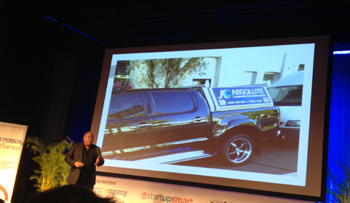Business Branding – What Makes a Powerful Brand?
Attended a very inspiring event last Saturday in Brisbane, called the Brand Accelerator Event, put on by Daniel Priestly and his engaging Key Person of Influence team.
The first speaker was Ian Elliot - former chairman and CEO of George Patterson, Australia's most successful advertising agency. Ian's presentation was around honing your message into the perfect pitch, and the importance of understanding and creating your brand. This is something he did very well for many companies, including a brand which is now huge in Australia - Optus. Ian demonstrated the unique process he used to come up with the one word which defined the essence of the telco's brand - YES.
He also regaled us with a delightful story about how he made his wife stop pull the Bentley over one day when they were on their way somewhere, so he could jump out and photograph a tradie's van he spotted. (His wife was a bit worried he wanted to swap the Bentley for a ute....)
This van "was one of the best examples of branding he had ever seen". Here it is.
I know it's hard to see in this photo - so I'll talk you through it. A well put together brand succinctly describes the service you provide, positions you against your competitors and makes it easy for people to understand the benefit they will receive from using your services. It's a lot to achieve in a logo - but this Sydney builder has managed to do just that.
Ian was impressed by this vehicle and branding for the following reasons:
- The vehicle was immaculate so the first impression is that the owner cares about appearance and quality.
- The company name - Absolute Carpentry and Construction is precise and there's no doubt what services they provide.
- The tag line - When Quality Matters - is the really clever part. This tag line immediately positions the company in the marketplace and lets you know straight up that they're not cut rate discounters, they're not cowboy operators and quality is everything.
One of the major benefits of this clever branding example is that the company name and tagline immediately defines which end of the market they work in, and therefore would only appeal to their target market sector, eg; the upper end - people who want quality, not the cheapest price. They would immediately knock out the price shoppers who suck up valuable time and there would be no need to discount heavily to compete.
What Does Your Brand Say About You?
It's really worthwhile having a look at your current branding objectively to see what it says about you - what impression it makes. If you can't be objective about this, ask your friends - pose the question on Facebook or Linked In. Get some feedback. You may think you have a clear brand which attracts the right target market and spells it out - but do your prospects think that?
It can be confronting and not what you want to hear. At the same seminar I met a lady who showed me her brochure and asked me for feedback. I was totally confused about what she did and didn't understand the product, the benefits or how to buy it - so I asked a few questions about the product and benefits and how it was different to competitive products. She became frustrated and then angry with me that I didn't immediately "get it" from the product name and brochure and had to ask questions. Mmm, and I was her ideal target market for this product too . . .
Be clear who your marketplace is, listen to them and brand your business to appeal to them and what they want and need. Don't be too arty or obscure or clever. It could annoy and deter people completely, or attract the wrong people all together.
If you'd like help reviewing or developing your brand - get in contact for a brand strategy and design discussion.



